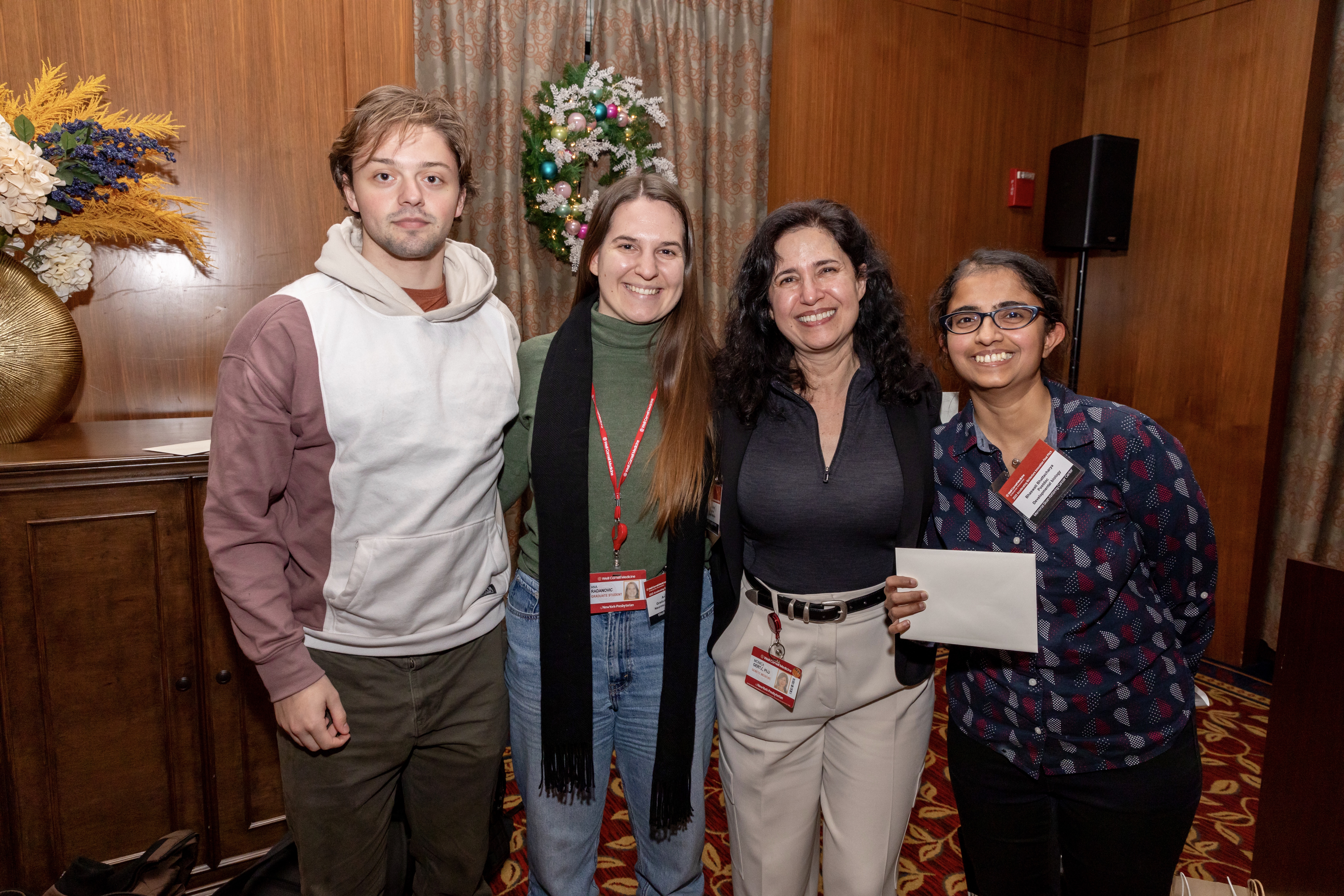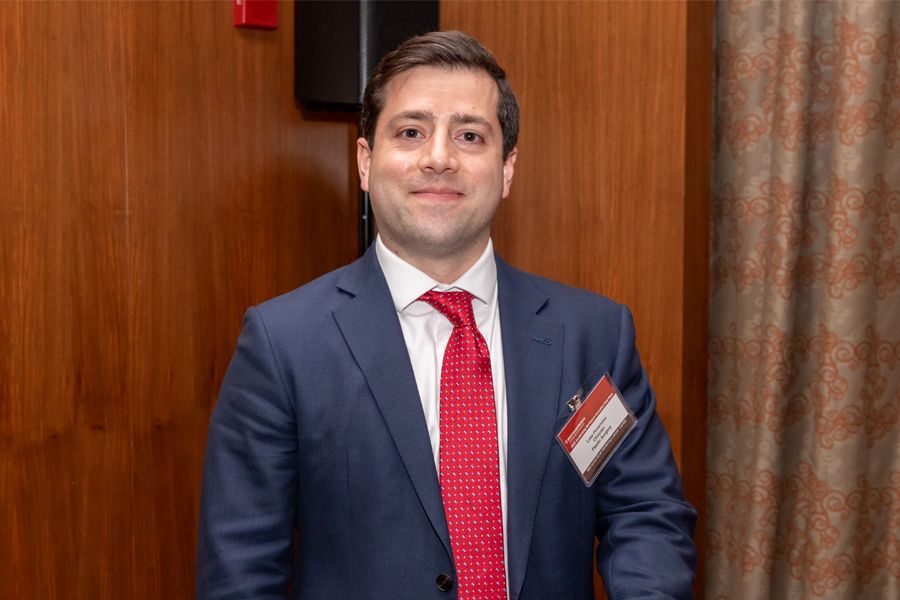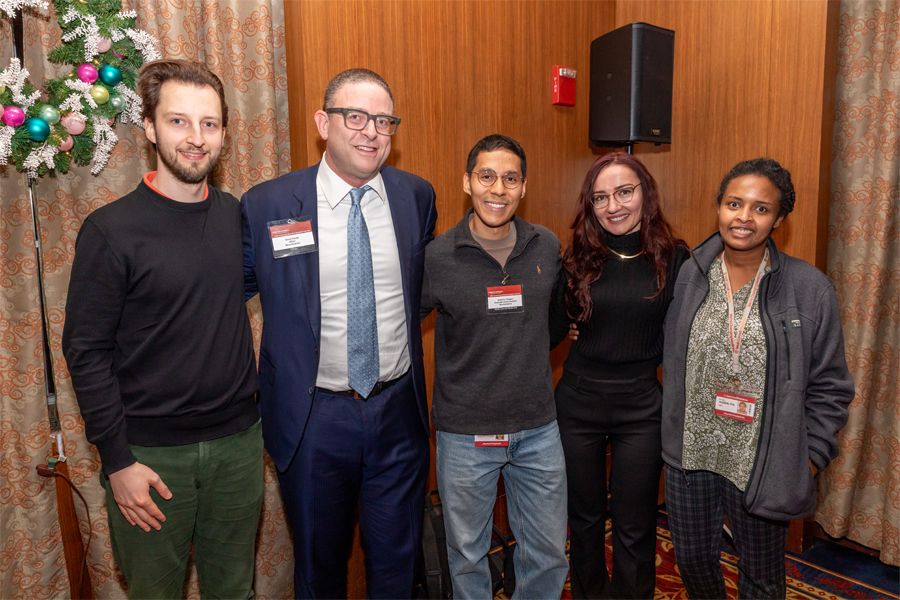
BioVenture eLab celebrated the hard work of its 2023 Accelerating BioVenture Innovation (ABI) cohort with a pitch event on Dec. 6 in Uris Auditorium. The group of graduate students, postdoctoral trainees and clinicians from Weill Cornell Medicine, Memorial Sloan Kettering Cancer Center and The Rockefeller University received 12 weeks of intense didactic instruction. They then spent three weeks putting their knowledge about intellectual property, research and development, and market research into polishing investor pitches for the Tri-I inventions that formed the basis of their experimental NewCos.
Seven finalist teams presented in front of a panel of venture capitalist judges who are trained scientists and have ample experience in both reviewing biomedical investment opportunities and operating life-science startups. The grand prize was a curated dinner and networking opportunity with distinguished Weill Cornell Medicine alumni from industry sponsored by the Office of Alumni Relations for the Weill Cornell Graduate School of Medical Sciences.
BioVenture eLab Director Loren Busby thanked lecturers, guest speakers, industry mentors and Cornell University Samuel Curtis Johnson School MBA students, as well as those enrolled in the Executive MBA/MS Healthcare Leadership program offered jointly by Johnson and Weill Cornell Graduate School of Medical Sciences, for providing the cohort with guidance and advice throughout the course. She also alluded to the significance of experiential learning offered by the ABI program and its impact on the technology transfer offices of the participating institutions. “These pitch decks can become starting packages for marketing and business development for worthy inventions or even the next startup company,” Busby said.
Team MyophonX won first place and the grand prize. Dr. Monica Gertz, a postdoctoral associate at Weill Cornell Medicine, presented the team’s technology, market research and business development plan. MyophonX is based on a novel wearable device, patented in May 2020, used to restore speech for patients who have undergone total laryngectomy due to laryngeal carcinoma. Compared with the two current market leaders, MyoPhonX’s technology is designed to be less invasive and produce more natural speech. The device has sensors to analyze electromyography (EMG) signals from facial muscles and decode them via artificial neural networks (ANNs) to produce speech. Its AI-powered learning algorithm allows the device to be trained by the patients, resulting in improved speech. Patients can record themselves prior to laryngectomy so that the AI algorithm can produce speech much closer to their own voices.
“We believe this device has applications extending beyond the clinical arena and are looking forward to the next steps of development and manufacture,” Dr. Gertz said.

Second place team Position Secure Implants represented by Dr. Luke P. Poveromo
Second place went to Position Secure Implants, which is creating an anatomically shaped breast implant shell with a smooth surface and specialized topographic indentations to allow for tissue in-growth and improved positional stability and aesthetic outcomes for patients. The Position Secure Implants team, including co-inventor and presenter Dr. Luke P. Poveromo, won an invitation to a community networking event at BioLabs @ NYU Langone, a specialized co-working facility for early-stage life science companies.
“The culmination of the course in the final pitch event in front of investors provided real-world application of our semester-long endeavors,” Dr. Poveromo said, “and will certainly serve as a springboard to pursue our own innovation interests."
The third-place winner was AlzAmine, an aspirational clinical-stage therapeutics company developing treatments for Alzheimer's disease. The team plans to develop the second generation of its lead asset, Benfotiamine, for improved delivery and potentially increased penetration of the blood-brain barrier. Their business development goal is to first target Alzheimer’s disease and then develop this new category of drug candidates for other neurodegenerative diseases. Dr. David Gould presented the pitch. He shared, “We are immensely grateful for the opportunity to build on the groundbreaking science that has been advanced by Dr. Gary Gibson of the Feil Family Brain and Mind Research Institute at Weill Cornell Medicine and the Burke Neurological Institute.”

Third place team AlzAmine
Other participating teams proposed innovative solutions for a wide variety of unmet medical needs including: a neuron protection drug as treatment for brain ischemia; a patent-pending technology combining genome editing with cell surface display to improve the selection of biallelically edited cells; a first-in-class vaccine that targets the fentanyl molecule to prevent overdose and opioid misuse; and a one-time injectable adeno-associated viruses (AAV)-based gene therapy for ALDH2 enzyme deficiency.
ABI is a prerequisite to a growing list of innovation and entrepreneurship initiatives available through Weill Cornell Medicine Enterprise Innovation as well as other cross-campus lab-to-market offerings. It consistently attracts many members from across the Tri-I community. In this 2023 cohort, 79 participants were grouped into 13 startup teams. "The ABI course builds confidence, leadership and entrepreneurship mindset towards personal growth," said Dr. Urmila Sehrawat, a Sloan Research Institute research scholar and final pitch participant.

